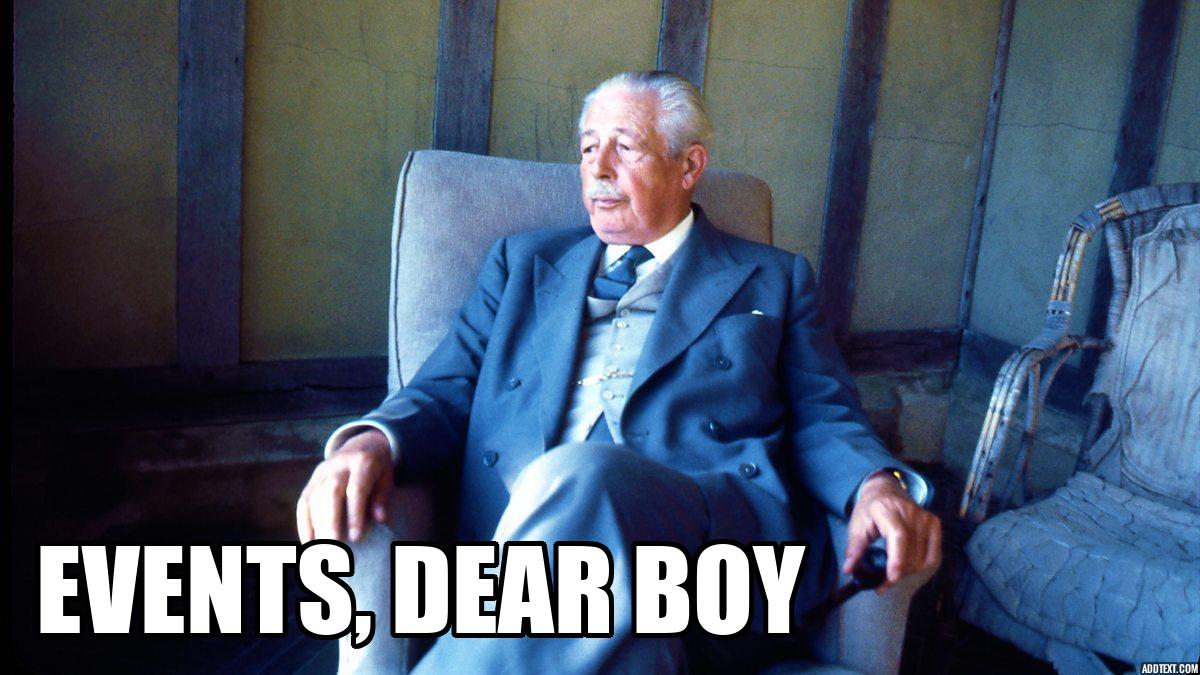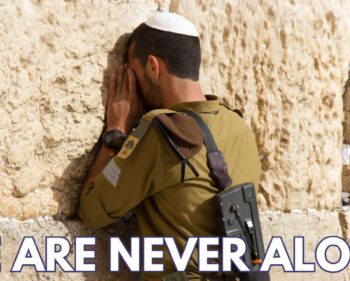EVENTS, DEAR BOY

Let’s begin with an obscure British prime minister. His name was Harold Macmillan. He wasn’t Churchill. He wasn’t Thatcher. He wasn’t even Tony Blair. But for seven years, from 1956 to 1963, he was the most powerful man in Britain.
Macmillan was a curious figure: a former army officer turned patrician aristocrat. He was educated at Eton and Oxford, wounded in the trenches of World War I, and was renowned for his sharp wit and brilliant off-the-cuff one-liners.
He became prime minister almost by accident, after Anthony Eden’s government collapsed in the wake of the disastrous Suez Crisis. For a while, he was wildly popular — they called him “Supermac” — until it all came crashing down thanks to a salacious scandal known as the Profumo Affair, which mixed Cold War espionage, illicit relationships, and dirty politics into a toxic cocktail that forced him to resign in disgrace.
Macmillan was a very competent politician and an effective leader of government, but truthfully, his career was shaped, and then broken, by events almost entirely outside his control.
Which is why Macmillan’s most famous quote, uttered with characteristic understatement and no doubt a twinkle in his eye, is so ironic. He was once asked by a young journalist what was most likely to throw a government off course. Was it the economy? Foreign affairs? Party politics?
Macmillan replied, with a wry smile: “Events, dear boy, events.”
And when you stop and think about it, how right he was. We like to imagine that we shape our own narrative, that somehow we control the way our lives unfold. But the truth is, our lives are shaped by events. Events, events, events.
And for Jews, over the past couple of years, since October 7th, events have turned our world upside down. On the one hand, extraordinary things have happened. Here’s the plus side: Hezbollah, Syria, and Iran — once the significant existential threats to Israel’s survival — have been cut down to size. They are no longer the menacing powers they once were, and that’s nothing short of amazing.
But then there’s the darker side. There’s the relentless campaign of delegitimization against Israel. And the surge of unfiltered antisemitism across the globe. All of it triggered by Israel’s inevitable — and utterly legitimate — response to the horrors of October 7th.
And the appalling reality is this: in the public imagination, the word genocide — a word once set aside for Jewish suffering, to describe the Holocaust — is now indelibly linked to Israel and Jews as perpetrators. It’s utterly sick and entirely untrue, but that’s what has happened. Meanwhile, Hamas, which perpetrated the barbaric massacre and kidnappings on October 7th, has been given a pass.
To add insult to injury, countries around the world are rushing to recognize “Palestine” — not only without demanding the dismantling of Hamas, but without even securing the release of the hostages who still languish in Gaza.
Events, dear boy, events.
So here we are, ushering in another Jewish new year. And the big question that gnaws at us — the question so many of us silently carry — is this: if events beyond our control dictate our destiny, then what are we doing in synagogue on Rosh Hashana?
We are here for all these prayers, these rituals, this crowning of God as King — but isn’t it all pointless? Are we just play-acting while history hurtles forward, indifferent to our efforts? Isn’t it really “events, dear boy, events” — and not our efforts in shul on Rosh Hashana — that will determine what happens in the coming year?
But that’s not the Jewish view. Yes — we don’t exactly know what the events of the coming year will look like, or when they will happen. We can’t predict the headlines of the year ahead. But what we can do is be prepared for them.
And that’s the whole point of Rosh Hashana. We prepare ourselves by structuring our lives around its themes. We can’t control the events, but we can control how we respond to them.
That is why the central themes of Rosh Hashana are Malchiyot, Zichronot, and Shofarot.
Malchiyot — we proclaim that God is King. In other words, events are not in the hands of politicians, armies, or journalists. They are in the hands of the King of Kings. Crowning Him is our declaration that behind the headlines, there is order, there is meaning, there is direction.
Zichronot — we remind ourselves that memory matters. Human beings forget. Nations forget. But God remembers. He remembers every deed, every tear, every act of faith, every sacrifice. October 7th is not forgotten. The hostages are not forgotten. Our prayers are not forgotten. Events may sweep across the stage, but none of them are lost in God’s memory.
Shofarot — the cry of the shofar reminds us that events are not the final word. They are the opening notes of redemption. The shofar is a jarring sound — it’s raw, it’s primal, it’s unsettling. But it is also a sound of hope, the sound of new beginnings, and the sound of a world about to be transformed.
So no, what we are doing in synagogue is not pointless. Not pointless at all. It is precisely the point. While the world shrugs and says, “Events, dear boy, events,” we stand here today and say: “Melech, dear boy, Melech!” Because it is not events that dictate our destiny. It is God the King.
And if you think about it, these three themes of Rosh Hashana are not just abstract categories of prayer — they map directly onto time itself.
Malchiyot anchors us in the present. Right now, today, in this moment, we declare God as King. Whatever the headlines say, whatever the chaos swirling outside the walls of the synagogue may be, we proclaim: God is here, God is in charge, God is the sovereign. And that gives us stability in the here and now.
Zichronot reaches back into the past. We know how fickle human memory can be. Politicians forget, the media forgets, and even we sometimes forget. But God never forgets. He holds on to every detail of our history — the good, the bad, the tears, the triumphs. Our past is not lost, it is preserved in His eternal memory. That gives our story continuity.
Finally, Shofarot projects us into the future. The shofar doesn’t look back — it blasts forward. Its raw, unformed cry tells us that the future is not fixed, it is still open, it can be reshaped, and it can be redeemed. And that gives us hope.
Past, present, future — Malchiyot, Zichronot, Shofarot. This is the Jewish response to “events, dear boy, events.” We don’t know the events before they happen, but we orient ourselves in time so that whatever comes, we are not just bystanders. We are participants in a drama that stretches from our past through our present into our future — all under the sovereignty of God.
From the 1930s until the 1950s, Rabbi Avraham Yeshaya Karelitz (1878-1953) was considered the greatest rabbi alive. He wrote and published many books, and he called them all Chazon Ish. “Ish,” which means “man,” is also the acronym of his name. “Chazon” means “vision” – because he wanted to teach the idea that every man, every Jew, must always look ahead with faith and optimism.
In the darkest days of the post-Holocaust period, in the early days of Israel as a newly formed Jewish State, many religious Jews felt that their days were numbered, that the Torah way of life would never recover. But the Chazon Ish never despaired.
He once told a young student, “If you only look at the events of today, you will feel crushed. But if you lift your eyes and see the bigger picture, you will see the hand of God shaping a brighter tomorrow.”
That perspective is exactly what Rosh Hashana trains us to do. To take the noise of “events” and lift them into the frame of Malchiyot, Zichronot, and Shofarot — past, present, and future — under the Kingship of God.
And that, my friends, is the point of us coming to synagogue on Rosh Hashana and Yom Kippur. Of course, Harold Macmillan was right — events can and do shape the course of history. But the Chazon Ish was even more right — we need to have a positive outlook about how the future will look, fortified by our faith in God and our belief in our destiny as his people.
And if we can hold onto that — if we can live with that faith, with that vision, with that clarity — then no matter what events the year ahead may bring, we will be ready. We will be prepared to face them. We will be ready to transform them. And we will be prepared to turn them into the story not of fear, but of blessing.
Because that is the story of the Jewish people. Time and again, events have tried to crush us — and time and again, we have risen higher, stronger, more united, more determined. This year will be no different. With God as our King, with memory as our anchor, with the shofar as our call to hope, we will not only endure whatever lies ahead — we will turn it into a year of blessing, of strength, of triumph, and of joy.

